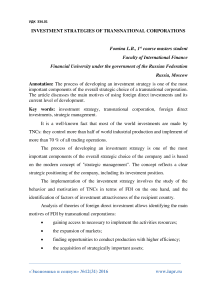Investment strategies of transnational corporations
Автор: Fomina L.B.
Журнал: Экономика и социум @ekonomika-socium
Рубрика: Основной раздел
Статья в выпуске: 12-1 (31), 2016 года.
Бесплатный доступ
The process of developing an investment strategy is one of the most important components of the overall strategic choice of a transnational corporation. The article discusses the main motives of using foreign direct investments and its current level of development.
Investment strategy, transnational corporation, foreign direct investments, strategic management
Короткий адрес: https://sciup.org/140117151
IDR: 140117151
Текст научной статьи Investment strategies of transnational corporations
It is a well-known fact that most of the world investments are made by TNCs: they control more than half of world industrial production and implement of more than 70 % of all trading operations.
The process of developing an investment strategy is one of the most important components of the overall strategic choice of the company and is based on the modern concept of "strategic management". The concept reflects a clear strategic positioning of the company, including its investment position.
The implementation of the investment strategy involves the study of the behavior and motivation of TNCs in terms of FDI on the one hand, and the identification of factors of investment attractiveness of the recipient country.
Analysis of theories of foreign direct investment allows identifying the main motives of FDI by transnational corporations:
-
• gaining access to necessary to implement the activities resources;
-
• the expansion of markets;
-
• finding opportunities to conduct production with higher efficiency;
-
• the acquisition of strategically important assets;
-
• more favorable legislation and policies.
Often multinationals carry out FDI with the aim of obtaining access to resources necessary for their activities, especially fuel and raw mineral resources and also human resources (skilled and relatively cheap labor force). In pursuit of this goal, TNC is trying to gain an advantage due to more favorable ratio of cost price. Therefore, the pricing of transnational corporations with access to resources with low cost, is more flexible, which ultimately can prove to be a major competitive advantage.
If TNCs want to expand their market, they will serve two purposes: increase in trade and opposition to the competitors, as well as creating outlets for surplus national production.
The desire of TNCs to increase efficiency is based on three main objectives: rationalization of production, economies of scale and risk diversification. Efficiency is defined as the optimal balance between revenues and expenditures of the company. In the case of acquisition of strategic assets with the goal of TSC may include the extension of production capacities; the transfer of production of certain goods in the maturity phase to the markets of countries with higher absorption capacity of the product; the opposition to competitors.
Diversification of trade and production led to the fact that along with these strategies, transnational corporations have developed new investment strategies that are not associated with equity participation of TNCs in the capital of the recipient countries. Global economic cooperation today is no longer limited only to FDI and trade. In recent years the role of intermediates such as non-equity forms of TNC expansion increased. According to the report of UNCTAD, these relationships basically are treaties between transnational corporations and their partners with no involvement of private capital TNC. Examples of such relationships are manufacturing and farming contracts, service outsourcing, franchising, licensing, management contracts. Despite the small share, the value of such production methods increases.
However, as a result of the global financial and economic crisis, the prospects of international expansion of TNCs have been looking quite volatile for a while. Also in the short term, the crisis has negatively affected plans of TNCs in the field of direct investments.
Nevertheless, TNCs are not willing to return to pre-crisis volumes of direct investment, and developing countries have difficulties in attracting capital, which in turn hampers the possibility of long-term forecasting of their further development. Together, these two aspects have led to a reduction in the volume of direct investment by transnational corporations.
The most adverse factors impeding the FDI by transnational corporations in the short term include:
-
• the deteriorating and uncertain Outlook for the global economy, the
risk of joining the world economy into a new recession;
-
• the uncertainty and instability of the world financial market, decrease
of confidence in financial institutions, the volatility of interest rates;
-
• the rise of protectionism in foreign trade that affect the conditions of
direct investment.
Список литературы Investment strategies of transnational corporations
- World Investment Report 2011. Geneva: UNCTAD, 2011. http://unctad.org/en/docs/wir2011_en.pdf
- World Investment Report 2011. Geneva: UNCTAD, 2015. http://unctad.org/en/PublicationsLibrary/wir2015_en.pdf
- Dunning J., Lundan S. Multinational enterprises and the global economy/2nd ed. Cheltenham, UK: Edward Elgar Publishing, 2008.
- Limonova E. Modern trends and changes in investment strategy of TNCs. Psychology. Economics. Law. 2013, 3. Pp. 57-64.


